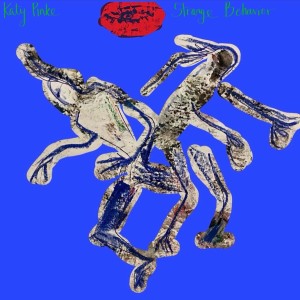
Artist
IMAGES: To download, click above. Press Photo Credit to Devin Armstrong.
Katy Pinke
Glamour Gowns
“High School,” the authoritative opening track of Katy Pinke’s sophomore album Look Around, begins at the beginning, as unapologetically as possible. “Giving you head on the bed, I wanted to know/What was my crime and why was I broke/Being my first time I thought you might show me/Something,” she recalls, tracing the lifeline of a deep wound back to its source. The Manhattan-based singer, songwriter, painter, and theater-maker relays her narrator’s origin story with humor and sadness, the discomfiting gift of hindsight lending it newfound perspective and depth. Each successive memory seems to be pushing her closer to transcendence—a recurring plot arc in Pinke’s catalog of spare and off-center experimental rock songs. “And with every song/A little bit less of you/A little bit less not true/To myself,” she sings. In this way, each track on Look Around—a mercurial, viscerally affecting big swing of a record—feels like a transformative act. The songs become mechanisms that help her protagonists navigate through emotional adversity, push against the limitations of their understanding of the world, and ultimately make peace with ambiguity.
Many songs in Pinke’s deep catalog outline this process, including those on the stripped down self-titled debut album she released earlier in 2024 (scored for just guitar, voice, and drum set). Pinke’s folk-inflected compositions cheerfully disregard verse-chorus structures, often maintaining a breezy and inviting quality even during their most gut-wrenching moments. Her lithe and disarming soprano is reminiscent of folk iconoclast Connie Converse and jazz singer Blossom Dearie (who she borrows a song from for Look Around) outlining instinctively but expertly shaped melodies. Pinke’s catalog of original music is vast, as regular attendances of her frequent concerts and multimedia productions in the New York City area and beyond can attest. Her creative restlessness and penchant for reinvention are on full display in the live arena; she frequently assembles fresh bands for each successive gig, offering up untested sets of music or reframing old standards with radical new deliveries.
On Look Around, Pinke seems to be synthesizing everything she has learned during her evolution in the live space over the past half-decade or so. She is in full arranger and co-producer mode, luxuriating in a wider dynamic range, juxtaposing odd electroacoustic disturbances, and rocking out full-tilt. While her first album documented her live presence at its most elemental, this record enhances that energy with inventive textures that underscore and complicate her narrators’ psychological trajectories. The choices made by her team of collaborators—including multi-instrumentalist and co-producer Nico Osbourne (Nicomo), guitarist Will Graefe and drummer Jeremy Gustin of Star Rover, revered singer-songwriter Trixie Whitley, and more—provide them with more stakes and an immediate holistic appeal. For instance, the soulful title track “Look Around” bubbles up around a simple four-chord sequence, with Pinke’s pacing quickening and vocal range slowly ascending through the end of the song. The band’s fugue-like echoes of the melody line function like a thicket of emotions, slowly compounding and mapping onto each other.
Though they spool out curiously and rarely repeat, the songs on Look Around do not feel like over-demanding listens, because Pinke never risks losing our dramatic interest. The compositions are paced irregularly but offer plenty of space and clear emphases, in the way an actor leaves room for their public to catch up and process a trenchant phrase in a monologue. Pinke counts avant-garde playwright and author Samuel Beckett as an inspiration for her artistic impulse to begin with a small, cellular idea—often, a plainspoken vocal phrase backed by a seesawing, couple-chord progression—and gradually complicate the discourse. Though accessed through an experimental approach, the end product inevitably has a broad appeal. Across the album, Pinke’s conversationality and gently asymmetric phrasing find resonances with celebrated modern craftsmen like Bill Callahan (the vocal contours in “Sadness Like Jewelry”) and Julia Holter (the text-driven meter shifts in “Hard Off”).
The main event on Look Around, however, is the unfettered humanity that is unfailingly on display. Across a given song, Pinke exhaustively follows an emotional event from start to finish, both in her lyrics and musical form. Inevitably, she moves from a modest and unambiguous kernel of thought (the eponymous realization in the solo piano and vocal “Not What I Thought”) to a final offering-up of the self to fate, the cosmos, or to one’s own mercy (for instance, the track “Strange Behavior,” where the band and Pinke explode in the final moments, finally acting out the behavior). “Robot Blues” includes one of the most transcendent moments of the record, in which an image of impossible struggle—“It’s funny how/I’ve been sitting here/Pushing a square/Into a circle”—inspires a total musical state change; the song shifts into triple meter and time seems to lag, with an elliptical guitar figure creating a whirlpool beneath the narration. Communication breaks down, no longer able to provide a filter for the protagonist’s boundless emotion. “I’ve lost/My language for/Something there/It’s something more/It’s just across/And I can feel/Just stay,” she sings.
In the swirling climaxes of Pinke’s songs, the fear that there may be nothing real outside of our own heads appears at the margins. Even an orange we thought we ate might have never existed. Whatever else is true—and maybe nothing else is true—the act of writing and performing feels grounding. It helps Pinke work through a convincing theory of the world that reflexively provides her narrators with a clearer view of themselves. If you observe it deeply enough, Pinke suggests throughout Look Around, reality may eventually seem like something worth counting on again. Few songwriters reach this tirelessly and earnestly toward revelation with as much single-mindedness and generosity of spirit.
– Winston Cook-Wilson


